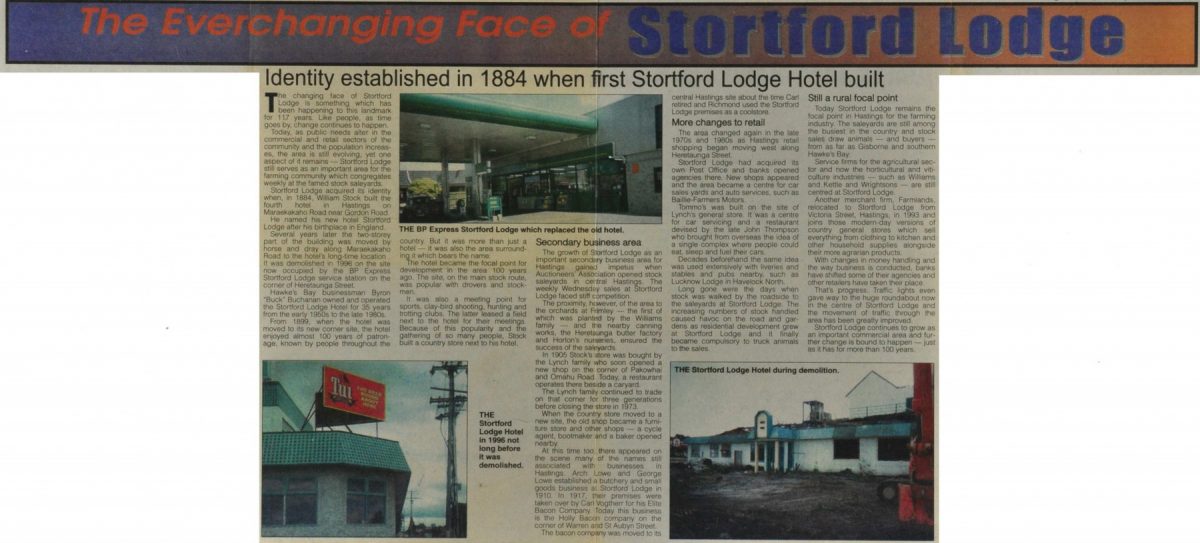The Everchanging Face of Stortford Lodge
Identity established in 1884 when first Stortford Lodge Hotel built
The changing face of Stortford Lodge is something which has been happening to this landmark for 117 years. Like people, as time goes by, change continues to happen.
Today, as public needs alter in the commercial and retail sectors of the community and the population increases the area is still evolving, yet one aspect of it remains – Stortford Lodge still serves as an important area for the farming community which congregates weekly at the famed stock saleyards.
Stortford Lodge acquired its identity when in 1884 William Stock built the fourth hotel in Hastings on Maraekakaho Road near Gordon Road.
He named his new hotel Stortford Lodge after his birthplace in England.
Several years later the two-storey part of the building was moved by horse and dray along Maraekakaho Road to the hotel’s long-time location.
It was demolished in l996 on the site now occupied by the BP Express Stortford Lodge service station on the corner of Heretaunga Street.
Hawke’s Bay businessman Byron “Buck” Buchanan owned and operated the Stortford Lodge Hotel for 35 years from the early 1950s to the late 1980s.
From 1899, when the hotel was moved to its new corner site, the hotel enjoyed almost 100 years of patronage, known by people throughout the country. But it was more than just a hotel – it was also the area surrounding it which bears the name.
The hotel became the focal point for development in the area 100 years ago. The site, on the main stock route, was popular with drovers and stock men.
It was also a meeting point for sports, clay-bird shooting, hunting and trotting clubs. The latter leased a field next to the hotel for their meetings. Because of this popularity and the gathering of so many people, Stock built a country store next to his hotel.
Secondary business area
The growth of Stortford Lodge as an important secondary business area for Hastings gained impetus when Auctioneers’ Association opened stock saleyards in central Hastings. The weekly Wednesday sales at Stortford Lodge faced stiff competition.
The proximity, however, of the area to the orchards at Frimley – the first of which was planted by the Williams family – and the nearby canning works, the Heretaunga butter factory and Horton’s nurseries, ensured the success of the saleyards.
In 1905 Stock’s store was bought by the Lynch family who soon opened a new shop on the corner of Pakowhai and Omahu Road. Today, a restaurant operates there beside a caryard.
The Lynch family continued to trade on that corner for three generations before closing the store in l973.
When the country store moved to a new site, the old soon became a furniture store and other shops – a cycle agent, bootmaker and a baker opened nearby.
At this time too, there appeared on the scene many of the names still associated with businesses in Hastings. Arch Lowe and George Lowe established a butchery and small goods business at Stortford Lodge in 1910. In 1917, their premises were taken over by Carl Vogtherr for his Elite Bacon Company. Today this business is the Holly Bacon company on the corner of Warren and St Aubyn Street.
The bacon company was moved to its central Hastings site about the time Carl retired and Richmond used the Stortford Lodge premises as a coolstore.
More changes to retail
The area changed again in the late l970s and l980s as Hastings retail shopping began moving west along Heretaunga Street.
Stortford Lodge had acquired its own Post Office and banks opened agencies there. New shops appeared and the area became a centre for car sales yards and auto services, such as Baillie-Farmers Motors.
Tommo’s was built on the site of Lynchs general store. It was a centre for car servicing and a restaurant devised by the late John Thompson who brought from overseas the idea of a single complex where people could eat, sleep and fuel their cars.
Decades beforehand the same idea was used extensively with liveries and stables and pubs nearby, such as Lucknow Lodge in Havelock North.
Long gone were the days when stock was walked by the roadside to the saleyards at Stortford Lodge. The increasing numbers of stock handled caused havoc on the road and gardens as residential development grew at Stortford Lodge and it finally became compulsory to truck animals to the sales.
Still a rural focal point
Today Stortford Lodge remains the focal point in Hastings for the farming industry. The saleyards are still among the busiest in the country and stock sales draw animals – and buyers – from as far as Gisborne and southern Hawke’s Bay.
Service firms for the agricultural sector and now the horticultural and viticulture industries – such as Williams and Kettle and Wrightsons – are still centred at Stortford Lodge.
Another merchant firm, Farmlands, relocated to Stortford Lodge from Victoria Street, Hastings in l993 and joins those modern-day versions of country general stores which everything from clothing to kitchen and other household supplies alongside their more agrarian products.
With changes in money handling and the way business is conducted, banks have shifted some of their agencies and other retailers have taken their place.
That’s progress. Traffic lights even gave way to the huge roundabout now in the centre of Stortford Lodge and the movement of traffic through the area has been greatly improved.
Stortford Lodge continues to grow as an important commercial area and further change is bound to happen just as it has for more than 100 years.
Photo captions –
THE BP Express Stortford Lodge which replaced the old hotel.
THE Stortford Lodge Hotel in 1996 not long before it was demolished.
THE Stortford Lodge Hotel during demolition.












Do you know something about this record?
Please note we cannot verify the accuracy of any information posted by the community.